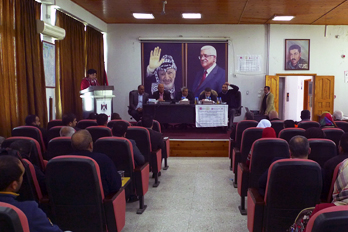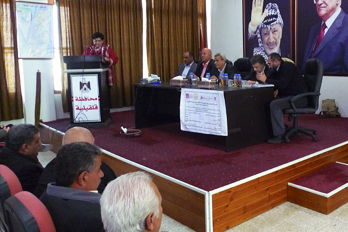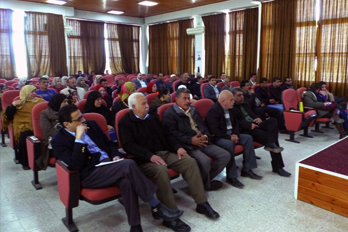Last March 2, the FPSC with the Agricultural Development Association (PARC) and a delegation from the Technical Cooperation Office in Jerusalem presented the training courses of the new rural development agreement “Sustainable and equitable rural development in the West Bank, including the start up and responsible management of land and water resources for small and medium farmers” financed by the AECID, at the offices of the Governor of Qalquiliah.
The event was attended by the Governor of the town, the general director of the Ministry of Agriculture in Qalquiliah, and the Mayor of Kufur Thult, who gave a presentation on the success that has meant for his locality the development of the FPSC Agreement that has ended recently, and several delegations from the districts of this governorate which will benefit from this Agreement.
This Agreement aims at sustainable and equitable rural development in the West Bank through an approach that includes commissioning responsible use and management of land and water resources with the active participation of all relevant actors in the agricultural sector. The beneficiaries are in the areas of Tulkarem and Qalquiliah seriously affected by the route of the separation wall with Israel, which has led to the loss of much of its fertile land and water resources (there are more than 33 water wells behind the wall separation), and consequently they have been deprived of their main source of income, which is linked to agriculture.
To help improve this situation, the following lines of action are considered:
- To increase agricultural production in Qalquiliah and Tulkarem by converting barren areas in irrigated lands.
- To encourage good environmental practices in the target communities, promoting the use of alternative sources of water (collecting rainwater and treating gray water), the implementation of pilot initiatives of irrigation systems maintained with clean energy (photovoltaic) the use of resistant crop species at low water, organic fertilizers, etc.
- To improve the institutional capacities of farmers and cooperatives in the target communities to ensure their viability and sustainability in the medium and long term, and ensuring fair and equitable processes in the value chain of agricultural products.
- To encourage the empowerment of women in the target communities, improving their socioeconomic status and their corporate and institutional capacities through incorporation into the production process with equity.







